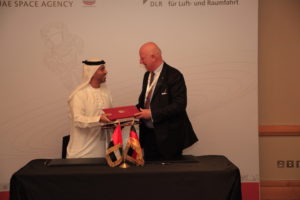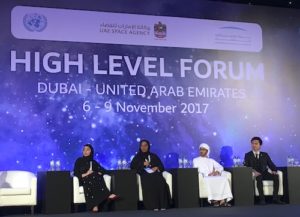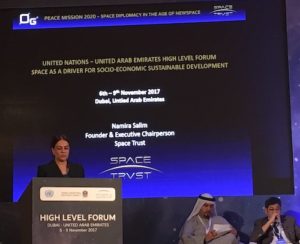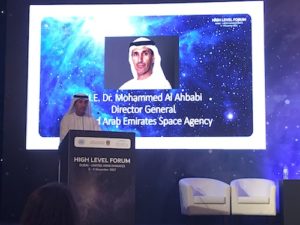The forth and last day of the United Nations/United Arab Emirates High Level Forum: “Space as a Driver for Socio-Economic Sustainable Development,” in Dubai, which is hosted by the Mohammed bin Rashid Space Centre (MBRSC) and jointly organized by the United Nations Office for Outer Space Affairs (UNOOSA) and the United Arab Emirates Space Agency (UAESA) brought together all input and contributions from the previous days.

One very important event was missed in yesterdays brief. The German Aerospace Center (DLR) and UAE Space Agency signed a Memorandum of Understanding on capacity buliding, knowledge transfer and cooperation in the peaceful use of outer space. Dr Gerd Gruppe, Member of the DLR Executive Board, responsible for the German Space Administration, and H.E. Dr. Ahmed Al Falasi, Minister of State for Higher Education in the UAE and Chairman of the UAE Space Agency, signed the documents.

The final day started early with a special session about Employment of Youth in Space Expolration Sector, moderated by Heyam Al Blooshi of the UAE Space Agency. Important questions such as; “Why do you study space technology?”and others were answered by students from Khalifa University Abu Dhabi, UAE University, and from the Space Generation Advisory Council. Zihua Zhu from the Asia-Pacific group of the Space Generation Adviory Council stated:
“Your voice matter in the space sector“
on the question about the importance of youth in the organization.
Naser Al Rashedi of the UAE Space Agency moderated the High Level Panel about Space as an Arena for Innovation, Integration and Investment with the subtitle Space2030 as an opportunity for Innovation, Integration, and Investment in order to generate the widest participation possible to promote space technology to address issues that are transnational in their nature and to deal with global concerns; and to strengthen unified efforts to all levels and among all relevant steakholders of the space sector in addressing the overarching

long-term development concerns of society with concrete deliverables pertaining to space for development. The long list of speakers required a breadth between these very intense an highly informative sessions. Dr. Gerd Gruppe of the German Aerospace Center started with emphasising German efforts in fostering innovation in the downstream segment. Science is the fundamental base for innovation and technology transfer is not a one way road. Dr Gruppe also welcomed the participants to the 2018 High Level Forum to Bonn, Germany. Gale Allen, acting NASA Chief Scientist, followed by Dr. Annadurai, Director at the Indian Space Research Organisation (ISRO), talked about the open data policy and examples for technology transfer, as well as about the economic and social benefits of space.
Dr Mohamed Al Junaibi, Executive Director Space Sector at UAE Space Agency, mentioned: “No matter how we try, countries have to make their home works for space and non-space.”
Andrey Afonin of Roscosmos introduced to the UNOOSA and the audience the Roscosmos Academy as a new regional center. It aims to train up to 15.000 people per year by 2020. Todays Russian space Industry has about 200,000 people. Mr Tortora from the European Space Policy Institute explained to the audience the importance of a proper space policy as a framework and legislation. Namira Salim of SpaceTrust proposed the peace element as a substantial part of the upcoming space documents for the UNISPACE+50. She is also fostering Public-Private-Partnerships in space and space diplomacy. Mr Piso, DG of Romanian Space Agency, Clementine Decoopman, the new Executive Director of the Space Generation Advisory Council, and Amer AL Sayegh from MBRSC finished the panel presentations.
Niklas Hedman of UNOOSA reviewed and approved with the audience the HLF2017 recommentations for the UNISPACE+50 event in Vienna 2018.
 In the closing remarks, Simonetta Di Pippo, Dr Mohammed Al Ahbabi, and Salem Al Marri pointed out that the High Level Forum is a place for exchange and to promote international cooperation and to discuss the implementation of the 17 Sustainable Development Goals.
In the closing remarks, Simonetta Di Pippo, Dr Mohammed Al Ahbabi, and Salem Al Marri pointed out that the High Level Forum is a place for exchange and to promote international cooperation and to discuss the implementation of the 17 Sustainable Development Goals.
The team of SpaceWatch Middle East should like to thank the organisers, the UNOOSA, the UAE Space Agency, and the MBRSC for their great and professional work and the very positive outcomes of the event. The SpaceWatch Middle East team will continue on reporting about the recommendation for UNISPACE+50 document.
Original published at: https://spacewatch.global/2017/11/day-4-uae-space-agency/
 SpaceWatch.Global An independent perspective on space
SpaceWatch.Global An independent perspective on space


